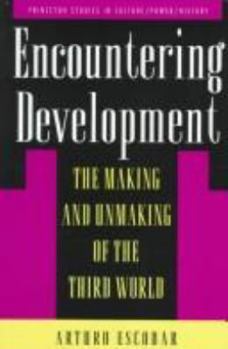Encountering Development
Select Format
Select Condition 
Book Overview
How did the industrialized nations of North America and Europe come to be seen as the appropriate models for post-World War II societies in Asia, Africa, and Latin America? How did the postwar discourse on development actually create the so-called Third World? And what will happen when development ideology collapses? To answer these questions, Arturo Escobar shows how development policies became mechanisms of control that were just as pervasive and effective as their colonial counterparts. The development apparatus generated categories powerful enough to shape the thinking even of its occasional critics while poverty and hunger became widespread. "Development" was not even partially "deconstructed" until the 1980s, when new tools for analyzing the representation of social reality were applied to specific "Third World" cases. Here Escobar deploys these new techniques in a provocative analysis of development discourse and practice in general, concluding with a discussion of alternative visions for a postdevelopment era. Escobar emphasizes the role of economists in development discourse--his case study of Colombia demonstrates that the economization of food resulted in ambitious plans, and more hunger. To depict the production of knowledge and power in other development fields, the author shows how peasants, women, and nature became objects of knowledge and targets of power under the "gaze of experts."
Format:Paperback
Language:English
ISBN:0691001022
ISBN13:9780691001029
Release Date:November 1994
Publisher:Princeton University Press
Length:304 Pages
Weight:1.00 lbs.
Dimensions:0.7" x 6.0" x 9.3"
Customer Reviews
1 rating
Reunderstanding development
Published by Thriftbooks.com User , 24 years ago
Arturo Escobar critics the whole concept of development in theory and practice from an extremely unusual and original perspective. He steps back and views development as something exotic and almost non-sense. Inspired on the work of Foucault, the author examines the evolution of the discourse about development as a form of how the West keeps exerting power and influence on the Third World. The ethnocentric views of development and interventions that come with them - propagated by Western governments, multinational companies, development institutions and academia - puts Third World cultures and traditional populations as something that should be significantly changed to achieve the so-dreamed "development." Although the results of these western-driven interventions over decades have usually been catastrophic for Third World's populations and cultures, Western "experts" keep coming to the Third World and elaborating new forms of discourses on development, now addressing objects like sustainable development, women and development and poverty erradication - all ethnocentric and based on western values. This book should be read by anyone who wants to reunderstand development in the Third World (and reflect if it is needed at all!).





